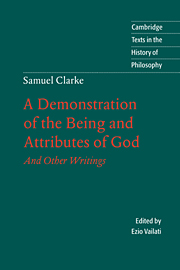A Demonstration of the Being and Attributes of God
Published online by Cambridge University Press: 07 January 2010
Summary
A Demonstration of the Being and Attributes of God.
More particularly in answer to Mr. Hobbes, Spinoza, and their followers.
Being the substance of eight sermons preached in the year 1704 at the lecture founded by the honourable Robert Boyle, Esquire.
All those who either are or pretend to be atheists, who either disbelieve the being of God or would be thought to do so or, which is all one, who deny the principal attributes of the divine nature and suppose God to be an unintelligent being which acts merely by necessity, that is, which in any tolerable propriety of speech acts not at all, but is only acted upon – all men that are atheists, I say, in this sense, must be so upon one or other of these three accounts.
Either, firstly, because, being extremely ignorant and stupid, they have never duly considered any thing at all, nor made any just use of their natural reason to discover even the plainest and most obvious truths, but have spent their time in a manner of life very little superior to that of beasts.
Or, secondly, because, being totally debauched and corrupted in their practice, they have by a vicious and degenerate life corrupted the principles of their nature and defaced the reason of their own minds. And instead of fairly and impartially enquiring into the rules and obligations of nature and the reasons and fitness of things, [they] have accustomed themselves only to mock and scoff at religion and, being under the power of evil habits and the slavery of unreasonable and indulged lusts, are resolved not to harken to any reasoning which would oblige them to forsake their beloved vices.
- Type
- Chapter
- Information
- Samuel Clarke: A Demonstration of the Being and Attributes of GodAnd Other Writings, pp. 1 - 92Publisher: Cambridge University PressPrint publication year: 1998

